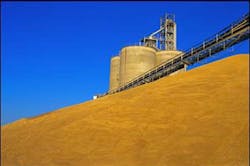Bartlett Grain Co. Reaches Settlement After Deadly Grain Dust Explosion
Bartlett Grain Co. and the U.S. Department of Labor (DOL) have reached a settlement after a 2011 grain dust explosion that killed six workers.
The Kansas City-based grain merchandiser has agreed to pay $182,000 following a review of proposed fines after an investigation of the fatal accident.
“By agreeing to the terms of this settlement, Bartlett Grain Company has made a commitment to invest in its employees, and work with OSHA to follow best practices, and make significant changes at its facilities nationwide,” said Kimberly Stille, OSHA’s regional administrator. “OSHA will ensure that Bartlett Grain implements its commitment to improve safety for all of its employees under this agreement.”
OSHA cited Bartlett Grain with willful and eight serious safety violations in April 2012. The investigation was a result of an October 2011 grain elevator explosion in Atchison, Kan. that killed six workers and left two others hospitalized.
The company’s willful violations included allowing grain dust – which is nine times as explosive as coal dust – to accumulate, using compressed air to remove dust without first shutting down ignition sources, jogging (repeatedly starting and stopping) inside bucket elevators to free legs choked by grain, using electrical equipment inappropriate for the working environment and failing to require employees to use fall protection when working from heights, according to the agency.
"The deaths of these six workers could have been prevented had the grain elevator's operators addressed hazards that are well known in this industry," said Hilda L. Solis, secretary of labor, in a previous statement. "Bartlett Grain's disregard for the law led to a catastrophic accident and heartbreaking tragedy for the workers who were injured or killed, their families and the agricultural community."
Serious violations OSHA cited Bartlett for included: proper preventive maintenance, certification and lubrication of grain handling equipment; inadequate emergency action plan training for employees and contractors; a lack of employee and contractor training on job hazards and a housekeeping program that was deficient because it did not prevent grain dust accumulations.
Before the recent settlement, the company originally was facing a total of $406,000 in fines.
In addition to having penalties reduced to $182,000, the agreement with the DOL requires Bartlett Grain to review its safety and health management system as well as consult with industry experts to conduct a detailed audit of the system’s effectiveness. The company must implement a variety of safeguards, training, and audit procedures at its 20 grain handling facilities in six states.
The company also is now required to give its safety manager the authority to stop unsafe operations; obtain a qualified third-party to review new installations or material modifications to dust filter collectors and grain stream processing equipment; update its housekeeping and preventative maintenance programs; enhance its training procedures and report to OSHA on a quarterly basis throughout the term of the agreement.
In addition, Bartlett will work with OSHA, the independent Grain Elevator and Processing Society, and the National Grain Feed Association to educate employees on hazards and share best practices for employee training and education, according to the agency.
An additional term details how the company now will supplement their annual employee grain training with outreach and training on grain engulfment and rescue to first responders and community members, including independent farmers, following any grain engulfment incidents within a 60-mile radius of any one of their facilities for a period of three years. Lastly, Bartlett will also acquire and maintain grain bin rescue tubes at all locations, according to OSHA.
"OSHA standards save lives, but only if companies comply with them," said Dr. David Michaels, former assistant secretary of labor for occupational safety and health, in a previous statement. "Bartlett Grain has shown what happens when basic safety standards are ignored, and this agency simply will not tolerate needless loss of life."
